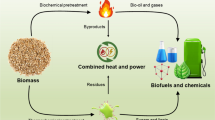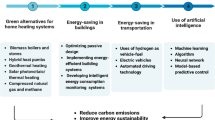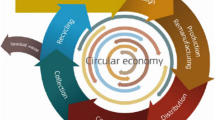Abstract
Renewable energy sources, including bio-energy technologies, have been introduced to overcome sustainability challenges, such as negative environmental impacts and energy insecurity due to reliance on fossil fuels. Logistics activities have a significant effect on the cost and environmental impacts of renewable energy supply chains. Understanding and reducing the carbon footprint of renewable energy supply chains can aid in mitigating environmental impacts. Thus, this research presents a mathematical model that can be used to optimize renewable energy supply chain logistics costs and carbon footprint. The proposed model considers a biomass-to-bio-oil supply chain, including harvesting and collection sites, bio-refineries, and distribution centers. It is assumed that mobile and fixed refineries will be used to produce bio-oil. The model considers the mass of biomass and bio-oil, number of mobile and fixed refineries, and number of truck trips to minimize total cost, where a carbon tax is used to represent carbon footprint in the mathematical cost model. A genetic algorithm is designed to obtain a near-optimal solution. Six scenarios for mobile and fixed refinery capacity are tested in performing sensitivity analysis of the model. The results indicate that the mathematical model of the bio-oil supply chain has reasonable relationships between input and output variables. The model is able to incorporate the impact of carbon emissions in a mixed-refinery bio-oil supply chain as a cost parameter. It was also found that increasing mobile refinery capacity has the greater effect on reducing total cost and carbon emissions than increasing fixed refinery capacity.






Similar content being viewed by others
References
Alsaffar, A.J., Raoufi, K., Kim, K.-Y., Okudan Kremer, G.E., Haapala, K.R.: Simultaneous consideration of unit manufacturing processes and supply chain activities for reduction of product environmental and social impacts. J. Manuf. Sci. Eng. 138, 101009–101018 (2016). https://doi.org/10.1115/1.4034481
Garretson, I.C., Mani, M., Leong, S., Lyons, K.W., Haapala, K.R.: Terminology to support manufacturing process characterization and assessment for sustainable production. J. Clean. Prod. 139, 986–1000 (2016). https://doi.org/10.1016/j.jclepro.2016.08.103
Coram, A., Katzner, D.W.: Reducing fossil-fuel emissions: dynamic paths for alternative energy-producing technologies. Energy Econ. 70, 179–189 (2018). https://doi.org/10.1016/j.eneco.2017.12.028
No, S.-Y.: Application of bio-oils from lignocellulosic biomass to transportation, heat and power generation: a review. Renew. Sustain. Energy Rev. 40, 1108–1125 (2014). https://doi.org/10.1016/j.rser.2014.07.127
REN21: Renewables 2017 Global Status Report. http://www.ren21.net/wp-content/uploads/2017/06/17-8399_GSR_2017_Full_Report_0621_Opt.pdf
Pantone, V., Laurenza, A.G., Annese, C., Fracassi, F., Fusco, C., Nacci, A., Russo, A., D’Accolti, L.: Methanolysis of epoxidized soybean oil in continuous flow conditions. Ind. Crops Prod. 109, 1–7 (2017). https://doi.org/10.1016/j.indcrop.2017.08.001
Isahak, W.N.R.W., Hisham, M.W., Yarmo, M.A., Hin, T.Y.: A review on bio-oil production from biomass by using pyrolysis method. Renew. Sustain. Energy Rev. 16, 5910–5923 (2012)
Ng’andwe, P., Mwitwa, J., Muimba-Kankolongo, A.: Forest Policy, Economics, and Markets in Zambia. Academic Press, Massachusetts (2015)
Woodall, C.W., Walters, B.F., Oswalt, S.N., Domke, G.M., Toney, C., Gray, A.N.: Biomass and carbon attributes of downed woody materials in forests of the United States. For. Ecol. Manag. 305, 48–59 (2013). https://doi.org/10.1016/j.foreco.2013.05.030
Lehman, C.: More than 500,000 Acres have Burned in Oregon so Far this Year. Oregon public broadcasting. https://www.opb.org/news/article/oregon-how-many-acres-burn-2017-eagle-creek/
Cutz, L., Haro, P., Santana, D., Johnsson, F.: Assessment of biomass energy sources and technologies: the case of Central America. Renew. Sustain. Energy Rev. 58, 1411–1431 (2016). https://doi.org/10.1016/j.rser.2015.12.322
Osmani, A., Zhang, J.: Multi-period stochastic optimization of a sustainable multi-feedstock second generation bioethanol supply chain: a logistic case study in Midwestern United States. Land Use Policy 61, 420–450 (2017). https://doi.org/10.1016/j.landusepol.2016.10.028
Mirkouei, A., Mirzaie, P., Haapala, K.R., Sessions, J., Murthy, G.S.: Reducing the cost and environmental impact of integrated fixed and mobile bio-oil refinery supply chains. J. Clean. Prod. 113, 495–507 (2016). https://doi.org/10.1016/j.jclepro.2015.11.023
Boukherroub, T., Ruiz, A., Guinet, A., Fondrevelle, J.: An integrated approach for sustainable supply chain planning. Comput. Oper. Res. 54, 180–194 (2015). https://doi.org/10.1016/j.cor.2014.09.002
Yue, D., You, F., Snyder, S.W.: Biomass-to-bioenergy and biofuel supply chain optimization: overview, key issues and challenges. Comput. Chem. Eng. 66, 36–56 (2014). https://doi.org/10.1016/j.compchemeng.2013.11.016
Mirkouei, A., Haapala, K.R., Sessions, J., Murthy, G.S.: A review and future directions in techno-economic modeling and optimization of upstream forest biomass to bio-oil supply chains. Renew. Sustain. Energy Rev. 67, 15–35 (2017). https://doi.org/10.1016/j.rser.2016.08.053
Zhu, X., Li, X., Yao, Q., Chen, Y.: Challenges and models in supporting logistics system design for dedicated-biomass-based bioenergy industry. Bioresour. Technol. 102, 1344–1351 (2011). https://doi.org/10.1016/j.biortech.2010.08.122
What’s a carbon tax? Carbon Tax Center. https://www.carbontax.org/whats-a-carbon-tax/
Cheng, C., Qi, M., Wang, X., Zhang, Y.: Multi-period inventory routing problem under carbon emission regulations. Int. J. Prod. Econ. 182, 263–275 (2016). https://doi.org/10.1016/j.ijpe.2016.09.001
Dilek, H., Karaer, Ö., Nadar, E.: Retail location competition under carbon penalty. Eur. J. Oper. Res. (2017). https://doi.org/10.1016/j.ejor.2017.10.060
Tian, P., Ma, J., Zhang, D.-M.: Non-linear integer programming by Darwin and Boltzmann mixed strategy. Eur. J. Oper. Res. 105, 224–235 (1998). https://doi.org/10.1016/S0377-2217(97)00024-6
Blum, C., Puchinger, J., Raidl, G.R., Roli, A.: Hybrid metaheuristics in combinatorial optimization: a survey. Appl. Soft Comput. 11, 4135–4151 (2011). https://doi.org/10.1016/j.asoc.2011.02.032
Talbi, El-ghazali: Metaheuristics: From Design to Implementation. Wiley, New York (2009)
Takao, Yokota, Mitsuo, Gen, Yin-Xiu, Li: Genetic algorithm for non-linear mixed integer programming problems and its applications. Comput. Ind. Eng. 30, 905–917 (1996)
Gen, M., Cheng, R.: Genetic Algorithms and Engineering Design. Wiley, New York (1997)
Miller, B.L., Goldberg, D.E.: Genetic algorithms, tournament selection, and the effects of noise. Complex Syst. 9, 193–212 (1995)
Author information
Authors and Affiliations
Corresponding author
Additional information
Publisher's Note
Springer Nature remains neutral with regard to jurisdictional claims in published maps and institutional affiliations.
Rights and permissions
About this article
Cite this article
Sadeghi, J., Haapala, K.R. Optimizing a sustainable logistics problem in a renewable energy network using a genetic algorithm. OPSEARCH 56, 73–90 (2019). https://doi.org/10.1007/s12597-019-00356-5
Accepted:
Published:
Issue Date:
DOI: https://doi.org/10.1007/s12597-019-00356-5




